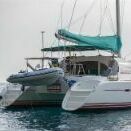Search the Community
Showing results for 'cost of diesel heating'.
-
I am not a live aboard and I moor my boat in a reasonably low end marina. I would say my standing cost is about £5000 per year, that is before I even visit the boat. A residential mooring would probably cost £3000 a year more, then electricity, gas, coal for heating and diesel to get to the pumpout which will probably cost £20 a time.
-
I think I was wrong, www says red can no longer be used in a generator, I had got confused between generation and non commercial heating. I think that currently HVO can not be used for heating so this pretty much prevents using any red HVO in a boat. This all relates to various subsidies on HVO which were devised without any consideratiion to boating. There are people working hard to get this changed as HVO makes a lot of sense on the Inland waterways, but paying full duty for propulsion, battery charging and heating is not attractive even if it was legal. Red diesel is currently pretty much limited to farming, forestry and boat heating. (and I think domestic heating though this is normally done with kerosine/ heating oil). A possible loophole is to get a trading licence so that your boat becomes a commercial boat......but this has more costs 😀
-
The price for the diesel that we put in our boats includes 11.14p per litre lower rate of duty. This is part of the purchase cost paid by the vendor. The declaration that we make is for the percentage of the higher rate of duty which is charged on propulsion. The total duty for a litre of fuel for propulsion is 57.95p, so the percentage applies to the difference between the two duty rates of 46.81p. VAT on fuel used for heating is 5% but it is 20% on fuel used for propulsion.
-

hydrogen boat with UK fuel cell completes testing
IanD replied to nairb123's topic in General Boating
The energy density of hydrogen per kg is high, about 3x that of diesel. However the density by volume is not, especially if stored as a gas instead of liquified -- which is done for rockets but still needs massive hyper-insulated fuel tanks compared to fuels like methane and kerosene, see the Spce Shuttle and SLS compared to Saturn V or Space X. For pressurised gas the cost and weight of the cylinders/tanks is *way* higher than the hydrogen inside... To store 10kg of hydrogen the tank volume at 350bar is 420l (147m3 of hydrogen at 1 bar); a tank (or cylinders) this big to store gas at 350bar is big, heavy and expensive. For example, a "lightweight" (non-steel) 300bar cylinder from BOC weighs 22.4kg, costs about £130 and holds 5m3 of gas, so you'd need 30 of these which would cost £4000 new and weigh 670kg. This is to store the same energy as 35l of diesel -- though given the efficiency of fuel cells compared to a diesel engine you'd need about 50l of diesel. Still, *way* smaller and cheaper and lighter than hydrogen, now and in any concievable future. https://www.boconline.co.uk/shop/en/uk/gas-a-z/hydrogen/genie-cylinder-hydrogen Of course fewer bigger tanks/cylinders like JCB use would be smaller and cheaper and lighter, but the fact remains that storing compressed hydrogen is expensive and needs a lot of space compared to liquid fuels -- the high energy density per kg doesn't matter one tiny bit. Of course batteries have even higher cost and weight, but they don't suffer the massive efficiency penalty of hydrogen. But the real killer is that if you have a solar or wind farm to provide energy for transport, it needs to be 3x as big today (maybe 2x in future) if you use the energy to make hydrogen instead of sending it down power cables to charge batteries, and the added cost of this dwarfs the cost of the cables. For domestic heating (using heat pumps) the penalty is smaller, only about 2x -- but burning the hydrogen in a boiler is an utter disaster, the penalty goes up to about 5x. Neither is remotely acceptable for large-scale use -- and for small-scale use hydrogen is even more pointless and expensive. Which is why there are no hydrogen cars (or boats/ships, except for technology demonstrators) out there to speak of (or used for domestic heating), and millions of EVs and heat pumps... 😉 -
I never said boats *need* a solid fuel stove, just that many *have* them because they're the cheapest form of heating -- especially burning scavenged wood -- and need no battery power. Diesel central heating systems are entirely possible -- that's what my boat has -- but are also more expensive to install and run, and need electric power. Which is fine if you have lots of it like I do, but not if you don't like many boats. The low-cost ones used in most boats (Webasto, Eberspacher etc) are also notoriously unreliable (though the newer ones are apparently better), they're not really intended for long-term all-day use on boats, they were designed (and built) down to a price as auxiliary diesel heaters in trucks. There are much better pressure-jet boilers, but these cost a lot more and also consume more electrical power -- same issue as above, OK for me but not most boats. Gas CH on a boat is super-expensive to run, and eats a lot of gas, and the cylinders have to be regularly replaced -- you'd need a dozen 13kg cylinders (cost about £700?) to get the same heating capacity as a 200l diesel tank, so around 3x the running cost.
-
If you want to go to HVO then this project maybe makes a little bit more sense, but you still have the diffcultities are delivering to a boat. There are currently technical/legal issues with boats and HVO but some of us hope these will be resolved soon. Red HVO will cost significantly more than red diesel but still less than DERV. An advantage of a tank is that you can fill it up when the fuel price is good. Lots of second hand heating oil tanks on eBay for a good price but usually collection only and usually not bunded. A new installation must be bunded, and will also need an approved concrete base. Plastic is probably better than steel. I suspect the EA thing is more a formality rather than big issue. I think a new diesel tank installation needs to suck the fuel from the top of the tank with a pump rather than having a tap at the bootom like a heating oil tank, you need to find out how strict this is. You could maybe get a standby generator to justify buying in the red but this might be on the edge of legality. A nice old Lister might look good in the garden 😀. I do not know if an oil company will deliver to a bowser, and taking the bowser to a boatyard might or might not work, and as I said will negate the cost saving. Also you can't get red HVO this way.
-
I find that my energy costs are much less than those who live in a house, a good conventional boat should be insulated, and have a solid fuel stove plus diesel, I think the cost of heating, cooking, and lighting is about £200 pcm for six winter months, and £20 pcm in summer. Having to generate your own electricity makes you careful. I still see liveaboard boats without solar panels, "hair shirt mentality"? I don't pay Council Tax, or mooring fee at the moment. A Residential mooring with shore power would alter the costs significantly, as one would expect.
-
Agreed. But unless you bring it from home as @ditchcrawler suggests there is no cost advantage over diesel. For example TFM Superstore* at Penkridge will sell you Kerosene from the pump at £1.09 per litre or £31.90 for a 20 litre container. At those prices you might as well burn diesel delivered straight to the boat. https://www.tfmsuperstore.co.uk/products/kerosene-per-lt/ *A reasonably priced outlet not that far from the canal. Other suppliers charge much more for 20 or 25 litre containers of 'emergency' heating oil for domestic users who have run out.
-
Coal and wood is cheaper than oil or gas heating. OK so a natural flued diesel heater with no electrics can be good but it will cost more on a per kilowatt basis. Bottled gas for heating is unbelievable in consumption terms. Bordering on shocking. Electric is crazy unless the boat is very small and well insulated. Most boats can't connect to mains gas although I read somewhere if one has a residential site with other services it may be possible to have mains gas installed. I think this probably only applies to non moving houseboats. Energy Density of Diesel Fuel Energy carrier Energy density by weight [kWh/kg] Diesel 11.6 Anthracite. Anthracite is an extremely dense, smokeless coal that burns slowly and has a very high calorific value; typically 9.2 kWh per Kg Red diesel around £1.20 per kg? Anthracite around 80p per kg. The anthracite is a bit cheaper but not a lot. Bulk purchasing options on boats are limited. Don't know why the formatting went wrong.
-

Electric hook ups and recharging electric boats
IanD replied to magpie patrick's topic in General Boating
The point of electric -- sorry, series hybrid -- boats today is not really emissions or cost savings, these are small and as you correctly point out don't solve the heating problem. To solve all this needs charging points and boats with solar and heat-pumps, for the same reasons as EVs and solar and heat-pump CH on land, and there's no serious plan for the charging points and such boats are *very* expensive... 😞 The point today is to be able to cruise along without noise and diesel fumes -- at least, most of the time until you have to run a (quiet, efficient) generator... 😉 And having been out (briefly so far...) on mine, I can assure you that this is a completely different -- and spooky! -- boating experience. But if you don't get the point or want one, nobody's forcing you to get one... 🙂 -

Bulk red diesel delivery & storage tanks
jupiter1124 replied to jupiter1124's topic in General Boating
Hmm, ok I was under the impression that this was a reasonably common thing to do. Surely there are some households that use diesel for home heating, or generator use for off-grid electric? Cost isn't actually the only reason. I also had another reason for doing this, being that I was interested in buying HVO to reduce my environmental impact, but I didn't want to complicate the original question. I don't know anywhere I can get HVO for use as boat fuel other than if I get it delivered, at least not in Notts. Anyways maybe since my garden is on water that this won't be an option for me anyway. I really don't want to do too much hoop jumping. Signing a declaration is one thing but having to inform the environment agency and what not is unappealing. Also, if I can't pay the propulsion myself directly then it's a bit of a non starter as I'd have to fill 60% of my tank at 100% "split" of expensive marina diesel anyway. But the main problem is needing 500l at a time and only having a 230l tank (and maybe 60l of jerry cans) I can't really meet the 500l minimum delivery without getting a storage tank. The bowser sounds like a pretty good idea, and I have a spot I can hide it in my garden. But a grand ... it will take a few years to pay back the cost of that, apart from the other issues above. I think you've convinced me that it's trips to the marina. I'd much rather go the other way sometimes 😂 -
Although probably supplied by Kuranda, the stove in question is likely a Wallas 87D stove. I had one in a previous boat and I loved it. Very economical and clean as it uses a sealed flame with it's own flue. The oven is much better than a gas oven as it's fan assisted and works just like an electric oven in a house. The hob also works just like an electric ceramic cooker. I used to run the oven as a heater as it was so economical on diesel! I never had any trouble with it although I was not living aboard. The down sides are the hob isn't as quick to heat up as a gas hob, and it does require 12v to operate. IIRC it draws about 8 amps when starting but once it's running it draws only 1 amp or so. They cost an absolute fortune so if your friend decided to sell it and go to gas they'd probably get a couple of grand for it! In summary, definitely not a no no.
-

Gas-free boat … any good for Constant Cruising
blackrose replied to Didne's topic in New to Boating?
Ok fair enough I misread diesel as a Eberspacher or Webasto, etc. Really? How many liveaboards do you know? Nearly all I know have one or the other, myself included. They're fine as long as they're used as a supplementary or secondary form of heating. I doubt that very much, not in my experience anyway. It's just not the way it usually works. The value of new installations comes through use to those living on or using the boat so it's still shouldn't be seen as "dead money". However the cost of those installations isn't generally recouped (even partially) when the boat is resold. -
Number one point! It's such a pain (and cost) to generate electricity on board during the winter* that minimising use is the best first step. And that means ditching electricity-hungry appliances. Hence the suggestions from previous posters that you look at solid fuel or diesel space and water heating and gas cooking. It goes without saying that lighting should be LED (except for your headlight). And keeping perishable food outside or in an underfloor locker can avoid fridge use in cold weather. *If you have lots of solar you may have a surplus of electricity in summer, but even so electric cooking and water heating will not always be achievable without running the engine.
-

Proposed new accessible electric narrowboat.
Matt Wardman replied to Andrew Grainger's topic in New to Boating?
(This is a longish post, but I want to make a case. Apologies if I am teaching granny to suck eggs - this is also for myself.) I think the low-energy narrowboat <> passive house comparison is interesting, but I'd think that a comparison to a 'typical' narrowboat might be as fruitful - as houses and narrowboats work quite differently. AIUI (as a serial renovator / self-builder and a MOD on the main UK self-build forum) a passive house achieves cost-effectiveness through radical reduction in energy requirement then retaining the heat, mainly heating through a pairing of reduced heat loss via superinsulation / physcial shape (ie being squarish) and reducing air leakage. Superinsulation means 5-8" of PIR (Celotex / Kingspan) in every external surface including roof and floor. Heating demand may be reduced by 80-90%, which allows a switch to all-electric, and the costs still to be well below a traditional gas-fired house. It is possible for a normal size passivehaus to have no heating upstairs except a towel radiator, maybe UFH downstairs, and a single plug in fan heater for when it is below zero in winter. They also are often set up as one or two zones only because the shell of the house is the heat/air boundary, which saves ££££ on posh heating controllers. Left completely alone and all switched off the internal temperature may fall by 1C over a weekend. It is sometimes the case that routine heating can be done via a small (say 500W) heating element in the MVHR (mechanical ventilation with Heat Recovery) air intake, but that is sometimes marginal in practice. For a passive house, overheating is as much a problem as cold, so reversible Air to Air heat pumps, which can be run backwards in high summer and are far more efficient than traditional AC, are becoming much more popular. I currently use a largish (~3kW heating / cooling capacity from ~1.3kW input power) portable heatpump AC/Dehumidifer in my own (well-insulated but not passive) house to make the central heating season a few weeks shorter in the shoulder months, which seems to work OK. Comparing to a narrowboat, there is not physically room for that much insulation (except maybe floor / ceiling?), and the lifestyle is open-doors usually - which makes heat retention difficult through the gangway being through all the indoor spaces, and the physical form factor is far less favourable to heat retention. I make the surface area:volume ratio of a narrowboat around 2.25, whilst that for an 8mx8mx8m house is around 0.75. One effect worth a note is that passive houses suffer less from draughts when one door is opened - because there is nowhere for the air to escape the house, it tends not to blow in. Helpful to narrowboat life? As an aside, people in passive houses who want a log burner often end up using 3-4kw boat-heaters, because anything 'normal' turns the place into a furnace very quickly. So where does that leave LENBs (Low Energy NarrowBoats)? I'd suggest that it is a game of marginal gains in everything, with a goal of reducing the total energy usage of the electric boat, which can be banked either as needing fewer batteries which take up less space , or a smaller genny, or as an increase in "self-sufficient without charge / connected to shore" duration. For goals, perhaps a 50-75% reduction in 'domestic' energy requirement and 10-20% in propulsion energy requirement over a 'typical' narrowboat are ambitious but forseeable - which will then reduce use of generators etc? There's a lot of energy modelling to be done, but there are tools around to do it. I think that if airtightness is pursued a total removal of gas / wood / diesel appliances in the residential space may be wise, unless room-sealed. I can see the CRT having kittens if not. For fruitful areas, I'd note recent developments in self-contained ventilation, and heating / cooling appliances using heat pumps designed for small apartments. eg There are now "through the wall" installable heat / cool air to air heat pumps on the market. I have ideas about specifics, but this post is long enough. I'll post again if there is interest. ATB all.- 392 replies
-
- electric
- insulation
-
(and 2 more)
Tagged with:
-

Proposed new accessible electric narrowboat.
manxmike replied to Andrew Grainger's topic in New to Boating?
I'd be interested to know roughly the size of budget for this boat - so far I can see the cost going up and up with no ceiling in sight. The battery bank alone will be huge to allow for heating and cooking, never mind propulsion. As was pointed out earlier - electric cars (and boats) are not particularly eco or green, the electricity has to come from somewhere to charge those enormous battery banks, usually from a power station (coal, oil, diesel, nuclear). Having said which, good luck, even the planning stage will be fascinating. By the way, some suppliers state their power comes from totally renewable sources - since they all feed into (and therefore out of) the national grid, most of the power available doesn't come from renewables. Unless your supplier has laid in their own cables and you're no longer connected to the national grid!- 392 replies
-
- electric
- insulation
-
(and 2 more)
Tagged with:
-
Apart from where they'll get it from (and how it will get to the boat) there's the usual question of "where does the energy to make it come from?" -- because even "green" hydrogen (meaning, using renewable energy) uses at least 2x as much renewable energy as just putting it straight into batteries, or any other more efficient form of energy storage. But looked at the other way, the total energy/fuel requirements of boats on inland waterways are tiny in the big scheme of things (about 1% of that from cars IIRC), and it could well be easier/cheaper to provide hydrogen filling stations where diesel ones currently are (marinas etc) instead of a network of electric charging points all round the canals close enough together and with enough sockets to charge tens of thousands of electric boats. Still, this is unlikely to happen without some kind of government subsidy, because apart from needing the hydrogen supply and distribution network the filling stations are expensive, and so is the hydrogen -- far more so than diesel, and the high manufacture/energy/distribution costs mean this is unlikely to ever get anywhere close to cost parity. And that ignores the cost of fitting hydrogen/fuel cell/electric drive to boats, which has a similar problem to hybrid boats today (very high cost) -- plus retrofitting is difficult because hydrogen tanks need a *lot* more space than diesel. Like heat pumps in houses, the costs mean there's no incentive -- actually, a negative one -- for boaters to fit such a system, especially if the resulting running costs are higher than sticking with diesel. This all looks like one of those ideas that's technically feasible (so the demonstrator will work) but without a properly thought-through plan on how to solve the hydrogen generation/distribution/cost/installation problems -- which will almost certainly need a big government subsidy. good luck with that given the current plan to reduce CART funding -- it'll never amount to anything... 😞
-

Proposed new accessible electric narrowboat.
Matt Wardman replied to Andrew Grainger's topic in New to Boating?
Great comment. As I see it in a narrowboat space, we are trading off 2 (or maybe 3) scarce resources - width of the space given to either living space, width given to insulation, and power input required to heat it (this last then feeds into u-value, type of insulation, type of power eg battery vs diesel vs gas, and then constraints around eg battery size or whether fumes can be tolerated). Exploring the compromises, and allowing for 12mm of panel, 4mm of steel, and a perhaps slightly generous 25mm of rubbing strip (or whatever the correct word is), with 25mm of insulation (I) each side giving U-value (U) of 0.67 we get a living space (LV) width of 6'4" to 6'5" on a 6'10" hull boat width. Or, as alternatives: 1 - 25mm insulation gives U-value 0.67 and LV width of 6'4". 2 - 50mm insulation gives U-value 0.36 and LV width of 6'2". 3 - 75mm insulation gives U-value 0.25 and LV width of 6'0". 4 - 100mm insulation gives U-value 0.19 and LV width of 5'10". So where's your sweet spot for your own circumstances? In my head I think I might personally be willing to lose an extra 3" of LV (ie option 2 and a half) and maybe go for a slightly longer boat (up to 57ft from 52ft say?) as a trade off for a further 50-60% reduction in heating costs / power, or even option 3, and the need to use a genny or fossil fuel stove a whole lot less. For me it would probably be for environmental and health reasons. We begin to get a feel for possibilities if eg we wanted to go as electric as possible for domestic or propulsion power, or if the cost of diesel doubled, or if we wanted to live aboard in winter, or if it was decided that inland boats be subject to similar emissions regulations as motor vehicles on roads. This is a simplified model of just one aspect, ignoring for example air leakage and the cold spots that are windows and doors (we can talk about those later), and condensation and drying washing, and heat from dogs, and there are umpteen other things to explore. On insulation materials I think spray PIR foam is the only game in town for hulls, and spray or slab PIR for renovations, perhaps with Aerogel sticky-back blanket for covering gaps with multifoil as a fall back. ISTM that the possibles are EPS (expanded polystyrene) and Rockwool (or something less itchy to use), or Aerogel blanket. Slightly different perhaps for underfloor, depending on how damp it gets. Rockwool and EPS are twice as thick as PIR for the same performance. Aerogel is 5-10x as expensive for not much more performance. And based on numbers from the Fit Out Pontoon (*) in Nottingham, the cost of spraying some more is a lot less per amount for the extra, and cost seems to be disproportionately in job setup not material cost. And anything not sprayed requires meticulous attention to detail to be as effective as possible. * https://www.thefitoutpontoon.co.uk/hull-integral-parts/insulation/- 392 replies
-
- electric
- insulation
-
(and 2 more)
Tagged with:
-
I care about pollution and the environment. I've made loads of small changes to my lifestyle in recent years in order to reduce my impact on the planet. I regularly make a conscious decision to do something that will take more time and/or buy something that will cost more, if I feel/know/believe that in doing so I am making a 'better' choice in terms of my environmental impact. But... I choose to use a log fire at home because we live in a big old house and it is FAR cheaper to heat one room than to use central heating, even with thermostatic rads turned off in other rooms. I choose to drive a car, because my job makes it unreasonably difficult not to have one, and because my children need/expect me to be able to ferry them around to their various schools, clubs, teams, social occasions etc. I choose that car to be a diesel because the electric infrastructure is currently not there to allow be to drive an electric car for my needs, and because both petrol and hybrid would be more polluting based on my driving habits. I don't believe any of those choices makes me a hypocrite. It makes me a rational person.
-
This post cannot be displayed because it is in a forum which requires at least 10 posts to view.
-

Probably a daft electrical, battery/alternator question
Alan de Enfield replied to casper ghost's topic in General Boating
It'll be a very expensive way of heating a calorifier full of water. To Heat 1 litre of water by 10C = 105Wh (.105Kwh) 1 litre of water by 60 degrees = 105Wh x 6 = 630Wh So with your 600 watt heater it will take ~1 hour for each litre you want heating If your engine uses 1 litre of diesel per hour (£1.50 ?) then it is going to cost you ~£1.50 per litre. Assuming your calorifier is plumbed in to the engine circuit you will of course get heat from that, which will reduce the time you need to use the immersion heater. -
We filled up with red diesel at Stockton Top Marina last Tuesday. The chap there told us that they have a fixed charge for diesel - they don't do the tax split that most places do. He said their diesel cost a set price of ninety-something-pence per unit and he said that was the upper price (eg. propulsion fuel price) - if we wanted a split price he said we should go to Calcutt. We weighed up the pro's and cons of filling up elsewhere, but decided that we'd just pay the fixed price since we were getting other services at that marina anyway and we didn't think we needed a huge amount of diesel. However, after I'd paid for it all, he told me I had to write my boat-number down and sign a piece of paper. That piece of paper showed a cost split for the diesel - the total for which was a lot less than I had paid him. I asked him why that was on the paper and he said it's something they just have to do for the regulations. I was unsure, but he was insistent that they have to do this paperwork, so I signed the piece of paper. I then noticed it had small print that said I had confirmed that I would used the fuel in a 60% / 40% split for heating and propulsion. Again I questioned this, because having one fixed upper price, I could use 100% on propulsion if I wanted to. He agreed and said yes I could use it all on propulsion if I wanted to, then he hastily took the piece of paper out of my hand and told me as he'd already told me I could have gone to Calcutt for the fuel and that I had chosen not to, I had to accept that they needed this paperwork and that-was-that. He made it quite clear that the conversation would end there! After Kev and I left, I felt increasingly uncomforatble about this and the more I thought about it the more I wondered whether this boatyard is operating a tax scam on the regulators/governement (purely my opinion and speculation, I hasten to add). Otherwise why be so insistent that I sign a piece of paper which, the more I think about it, is clearly falsifying information? Do they get to pay just the split-rate tax percentage to the government bods who regulate the system, and pocket the rest they've charged us? And if so, how many other punters have they done this to aswell? We chose to pay the higher rate for our fuel, that's fine. But what I'm concerned about is that I'm not sure they're being honest with the regulators about what they're charging us. Or do you guys think I've got this all wrong and there's a legitimate reason for me having to sign a piece of paper that says I paid a lot less than I really did for my fuel? What do people think about this? Are there other boatyards doing this? (Incidentally the chap at Stockton Top Marina told us that Kate Boats in Warwick do the same thing (but they're run by the same people) - so there's at least two boatyards doing this as standard practise. I'm just curious as to everyone's thoughts about it...?
-

Proposed new accessible electric narrowboat.
IanD replied to Andrew Grainger's topic in New to Boating?
I looked at using a heat pump (actually a marine AC unit) to heat my boat, and also cool it in summer -- specifically, this one (the biggest 16000BTU version): https://www.frigomar.com/en/products/self-contained-unit-inverter-bldc/ Excellent efficiency (almost 5kW maximum output for 1kW of power) and can be throttled down to 25% -- note that it's a blown air unit so you have to run 5" diameter ducting through the boat. The problem is that it uses fresh water from the sea/river/canal and that the minimum temperature for this is +5C to stop it freezing in the heat exchanger -- so fine for most boats at sea, but not the canals in the winter when you *need* the heating... 😞 In theory you could use a massive skin tank and fill the system with antifreeze, but the unit will still turn itself off below +5C intake temperature. Also I was told by somebody who tried this (skin tank) that it didn't really work and they had to go back to fresh water intake. Unless you're only ever going to do short cruises away from base (a big battery bank will last up to 2 days) or no more than a couple of hours per day in summer (recharging from solar, but you'll only get about 5kWh per day on a boat that size) you'll need an onboard generator, and cocooned diesel ones are expensive (around £15000 installed). It would be nice to run this on HVO but this isn't widely available on the canals, if at all. Finesse used to reckon that the cost of the electric drive including batteries, inverter, and generator was around £30000 but that was several years ago. Given the price rises I saw during construction of my boat (a couple of grand just for the generator!) I expect this would be closer to £40000 today. They've built a lot of electric (well, series hybrid...) boats and don't cut corners, I can certainly recommend them.- 392 replies
-
- 2
-

-
- electric
- insulation
-
(and 2 more)
Tagged with:
-
Dunno if you've seen the waterside moorings site but there's a residential mooring at the bottom of this list in Horbury for £3500pa for up to 57feet. I don't know Horbury at all or whether there are transport links that you could use but that's a pretty good price for an official residential mooring. You'd pay council tax with it being residential, so band A for the local area, single person discount if you're on your own, call it another £1k. That's your rent and council tax for £375/month. Your bills will be quite high in the colder months for heating (work on up to a couple of hundred) but really quite small in the warmer months. Then there'll be your license fee, insurance and ongoing maintenance costs like engine servicing - much cheaper if you can DIY & it's not rocket science. Try to have a contingency fund of a few thousand and start learning about diesel engine maintenance and troubleshooting, basic 12v electrics, etc. Somebody else already said but I'll repeat, go see some boats to start getting an idea what you can get, definitely go and have a look at the one Jax mentions. Good luck with it all...





